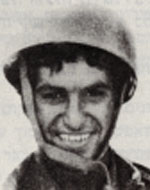Yom-Tovian, Eli
Eli (Eliahu), son of Hannah and Shlomo, was born on March 8, 1954 in the village of Kadima, where he was educated at the “Urim” school in his native village and continued his studies at the “Neurim” high school in Kfar Yanai Eli was the fourth child of Hannah and Shlomo Yom Tovian, and as a child he played in the yard, isolated himself in the corners of the garden and asked to see and understand everything around him. To discover his own secrets of existence and to learn about his own independent school activity, but he did not intend to work in this field. He learned to read books of various kinds in order to expand his education, and Eli always loved the agriculture and was always willing to help with his own hands and cultivate with devotion and affection the gardens’ gardens. He worked in the chicken coop and in the orchard, tended to prune the grass and took the paths and even planted a cactus corner, known as “Eli’s corner.” He was a sports fan and took advantage of his free time for various sports activities. Every Saturday morning he rushed with his brother to the soccer field, a short-sleeved shirt and shorts to his sturdy body, and the guys knew: There is no football game without Eli. Eli was a sociable boy. Adults as boys were attached to him and captured by the charm of his vibrant personality. In the months leading up to his enlistment in the IDF, he traveled extensively throughout the country, seeking to see new landscapes and discover the secrets of nature, and his desire to get to know his country in the near future was unthinkable. Eli was drafted into the IDF in early February 1973 and volunteered for the paratroopers. After completing basic training, he took a parachuting course and was authorized to wear the wings of a parachutist. Eli served in the paratroopers for a few months before he fell, but in those few months he bought him many friends and fans. One of his friends in the unit notes Eli’s good mood. His Lev laughter, in the midst of hard training exercises, pleased the hearts of his colleagues and created a pleasant atmosphere in the unit. “Eli had a developed sense of justice, and he did not hesitate to meddle between two friends who had quarreled, to find out what the matter was and to make a compromise between them, and because of two characteristics I admired: the indifference and caring about his surroundings, To others. ” When the Yom Kippur War broke out, Eli rushed to his base and was sent to Sinai with his unit. He fought as a cabbage in the infantry unit with courage and devotion. To remove any concern from the family, he made sure to send letters of encouragement home to his parents. “There’s nothing to worry about, everything’s fine, I do not miss anything,” he wrote the day before his death. On October 24, 1973, Eli’s unit fought against the cleansing of the city of Suez. In this battle, Eli was killed by a direct hit. He was laid to rest in the civil cemetery in his native village, Kadima. He was survived by a father, a mother, three sisters and a brother. After his fall, he was promoted to corporal. Plans for the development of the agriculture, dreams of travel and nurturing friendships were interrupted by their father and Eli, aged 19. In a letter of condolences to the bereaved family, the unit commander wrote: “Your son fulfilled his duties faithfully and was acceptable to his friends.”
